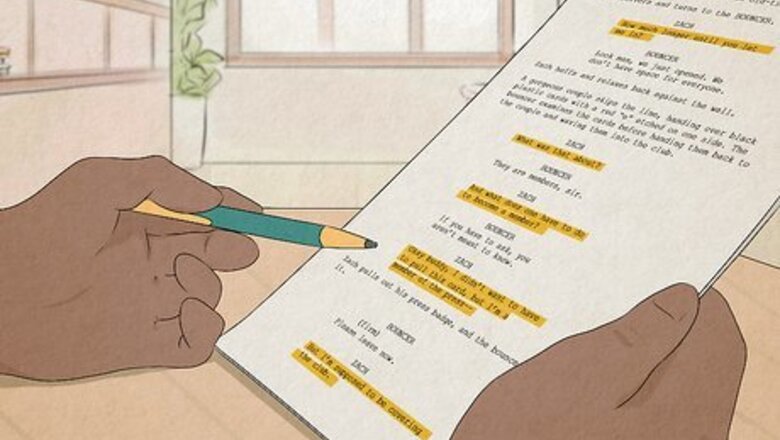
views
Get started as early as you can.
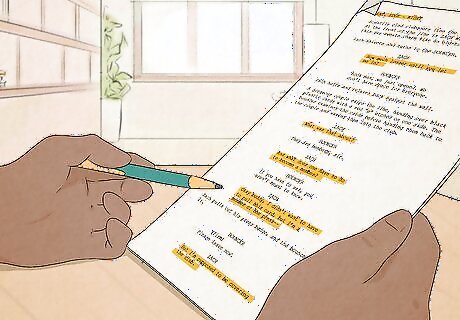
You’ll generally need a few weeks to memorize your lines, so start early. Obviously, the number of lines you’ll need to memorize plays a big part in this, but you’ll need a few weeks to commit even a handful of lines to memory. As soon as you get your hands on the finalized script, start practicing! While it’s okay to take a day off every now and then, you likely want to practice every day if you want to memorize your lines as quickly as possible. If you’re playing the main character or something, you may need months of preparation. This will be different for everybody, but the point here is that you shouldn’t wait to the last minute.
Read your lines for comprehension.

Get through the entire script so you understand what’s going on. It’s exceptionally hard to commit something to memory if it’s meaningless to you. Read through the script and don’t worry about paying any special attention to your lines. Just comprehend the story. This will make it a lot easier for you to process what you’re learning. This is especially important if you’ve been cast in a Shakespeare play or something like that, since it may take a few readings to understand the language.
Identify your cues.
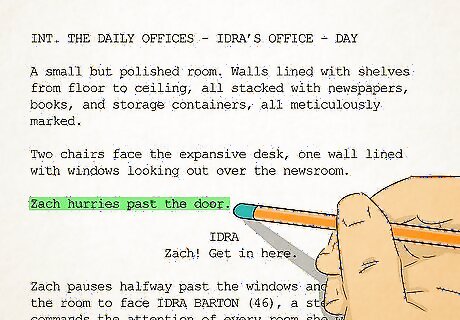
Memorize the lines before your lines so you know where to come in. The lines before your dialogue are your cues, and you’ll need to know them well if you’re going to get the timing down. Memorize the cues alongside your dialogue so that you keep them separated and clear in your mind. There’s an upside here, too. By including the cues, you’ll build something called associative memory. You’ll start to associate that little bit of dialogue that isn’t yours with the sections as you learn them, which will actually help you memorize your lines faster! For example, if you’re memorizing a line and the bit of dialogue before it ends with “…and your sister won’t pick up the phone,” then work on memorizing “pick up the phone” alongside your dialogue.
Reread your lines over and over.

Repetition is cliché, but it’s a popular method for a reason! Re-reading your lines over and over again may sound ineffective, but it really will help you generate memories. As you work on memorizing, keep reading the section you’re working on 4-5 times before you try to recite it or remember it in your mind. Remember, you don’t need to lock yourself away for hours at a time while you’re doing this. Break it up in chunks! If you’re more of an auditory learner and you’re learning a well-known play, get the audiobook. Listening to the lines repeatedly will help a great deal if you struggle reading for long periods of time.
Repeat the dialogue out loud.

Once you’ve read the lines, say them out loud over and over. The sound of the words coming out of your mouth is essential when it comes to codifying the dialogue in your mind. Read the line while you say it out loud. Then, take your eyes off of the script and say it out loud again. By doing this over and over again, your brain will get used to the sounds and you’ll internalize the words. Some people find that singing their lines can help as well. If you get bored of saying the words in your boring old reading voice, try putting them to a tune!
Break big monologues into sections.
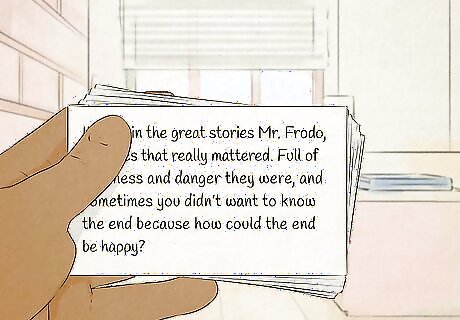
Chunking large bodies of text into smaller pieces makes them easier. Settle on a handful of “false” cues in your dialogue and mark them in the script. Work on memorizing the first set of lines. Then, work on the additional sections separately. Put special emphasis on each of your cues while you memorize. This way, each cue will work kind of like a hinge that connects the sections together, and you’ll flow seamlessly from one section to the next. As you master each individual section, practice putting all of them together. Try reciting the entire thing out loud to see if you can do it!
Enlist friends to read the other roles.

Practicing entire scenes with others is a great way to master the lines. You’ll put a tiny amount of pressure on yourself to not forget your lines with other people around, which will help you test how well you know your lines. On top of that, reciting your lines organically with other people will replicate the big night. This is a great way to get comfortable with the lines you’ve learned.
Act out your lines while practicing.

It’s easier to internalize lines if you associate them with movement. If there are stage directions associated with your script, use those to inform your movements. Otherwise, make up your own actions and gestures. Physically acting out your lines will help you commit the words to memory. You may feel a little goofy walking around your home like there’s an audience in front of you, but it works! If you don’t want to act out your lines, or you can’t because the scene doesn’t involve movement, just walk around. Moving your body while you memorize will make it a lot easier for your brain to commit things to memory.
Use a rehearsal app.
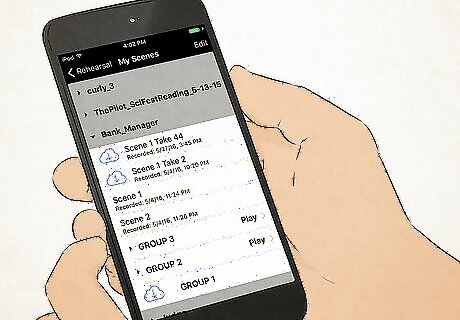
There are tons of memorization apps you can use to help you learn lines. If you prefer to learn in a more interactive way, download an app on your phone or tablet to help you memorize. There are plenty of options when it comes to line-memorization apps. Some of the most popular options include: Rehearsal Pro. This app will provide you with a variety of techniques and walk you through how to use them. If you feel like you’re hitting a brick wall, this is a good way to go. Script Rehearser. This program allows you to play back portions of your dialogue to memorize it in chunks. It will also compare your attempts so that you can see where you’re rushing or taking too long. Mind Vault. This is a great app for testing yourself on how well you know your lines. It generates quizzes based on what you’re memorizing to help you practice.
Record your lines and listen to them.

Use the audio recording function on your phone to record your lines. Whenever you want to practice but you’re preoccupied with something else (or you’re taking it easy for the night), play back the recording! Hearing yourself recite the lines will help cement them in your subconscious mind. You can even play the recording when you’re driving or taking a shower. Recite your lines along with the recording, like you’re singing along to your favorite song. Try listening to the recording on repeat while you sleep. It’s an old trick, but there’s scientific evidence that this works!
Visualize the scene.

As you read, picture yourself as the character performing the actions. If the character is talking to their boss in the script, imagine yourself sitting in the office saying those words to a fictional manager. By visualizing the actions in the script, your mind will have a much easier time separating the scenes and lines. If there’s a movie version of the play you’re learning, watch it! The images will give you some context to work off of when it comes to internalizing your lines.
Color-code your dialogue.

Use highlighters to separate chunks and sections visually on the page. You can give the beginning, middle, and end of large monologues their own colors, or use different colors to highlight the first word of each line in the beginning, middle, and end of the script. However you want to do it, your brain will associate the color with the dialogue that goes with it over time and make it a lot easier to remember distinct sections of dialogue. You can highlight the side of the page where your dialogue is located, or highlight the lines directly.
Write your lines out by hand.

Transcribing your lines by memory is a solid way to lock them in. Since it’s easy to move quickly through your lines when you say them out loud, slowing down is a great way to test your memory. Grab a piece of paper and start writing your lines out from the top. Get as far as you can without referring to the original text or saying the lines out loud. This will give you a good sense for how well you you’re your lines, and it will help you memorize, too! See if you can write them out while you do something else, like watch TV, for an added layer of difficulty. If you can do this, you’re solid!
Stay confident.

Your memory is better than you think, and people tend to forget when they’re anxious. On the big night, trust yourself. You’ve put the work in, and there’s no reason to assume that you’ll forget the lines now. Anxiety and nerves are going to be a much bigger barrier than your memory, so just pretend like you’ve mastered your lines 100% and let your subconscious mind do the rest. You’ll be much less likely to forget something if you have the confidence that you won’t! If you do forget a line in the heat of the moment, improvise! Work through it and keep your improvisation as close to the original text as you can remember. You’ll be very likely to stumble back on to the correct language soon.

















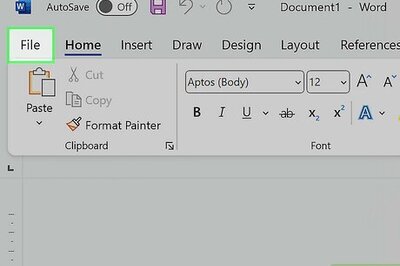
Comments
0 comment